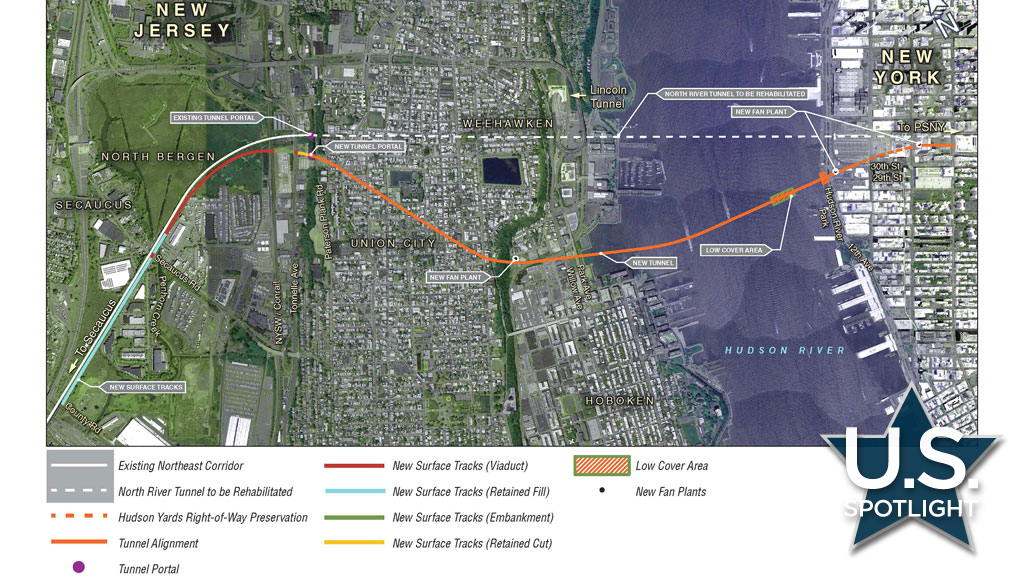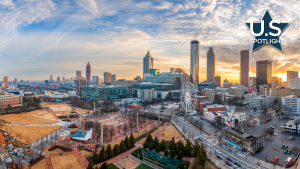After years of planning and work on preliminary engineering, the 4.5-mile-long passenger rail Hudson Tunnel Project between Pennsylvania Station, New York and Secaucus Junction, New Jersey, got a $6.88 billion injection through a grant from the Federal Transit Administration.
“We were surprised with the number, which is terrific,” says Stephen Sigmund, chief of public outreach with the Gateway Development Commission (GDC), the organization created by New York and New Jersey for infrastructure projects along the northeast corridor (NEC) rail line that runs between the two states.
Plans call for construction of the new two-tube, 2.4-mile rail tunnel linking New Jersey to Penn Station in Manhattan, plus related infrastructure work.
“We call it and believe it is the most urgent infrastructure project in the United States,” says Sigmund.
The rail link between New Jersey and New York also connects the NEC from Boston to Washington. It is the most heavily used passenger rail line in the country, hosting more than 2,200 train movements and 800,000 passenger trips daily, he says.
The ambitious transit project includes the rehabilitation of the 113-year-old North River Tunnel, which was damaged in 2012’s Superstorm Sandy.
That “one-track in, one track out” aging tunnel has been fraught with delays, causing “an enormous impact on the national and regional economy,” Sigmund told the Daily Commercial News.
“The problems we’ve seen from this tunnel over the years in terms of delays, the inundation of billions of gallons of water from Sandy…has been intolerable.”
To be completed in the mid-2030s, the new line and rehabilitated one will eliminate a single point of failure for the NEC, providing long-term resiliency, reliability, and redundancy to the regional and national rail network, he says.
The overall project is estimated at about $16 to $17 billion.
While the tunnel starts and ends at shallow depth, boring machines will dig deep, in some areas about 110 feet down, to complete the project.
“It goes in a U-shape underneath the river bed.”
Preliminary engineering, about 30 per cent of the design, has been completed by the Gateway Trans-Hudson Partnership, a consortium comprised of WSP, AECOM and STV.
The civil works construction – the largest portion of the project – is being broken up into four contract packages to ensure a competitive bidding pool.
Two of the contracts are design-build, the others are design-bid-build, Sigmund says.
One contract scheduled this year on both sides of the Hudson involves river ground stabilization. Two other packages starting next year include the tunnel section through the Palisades to the shaft in Hoboken, N.J., and the tunnel portion through the bulkhead of the west side of Manhattan that connects to West 30th and 29th Streets.
Starting in 2025 will be a contract to tunnel under the river from the new construction shaft in Hoboken to the new one in Manhattan, Sigmund adds.
��������ion of the new tunnel is scheduled for completion in 2035; the century-old North River Tunnel rehab is slated for completion in 2038.
Three firms have been shortlisted for project delivery, with a request for proposals scheduled by the end of summer.
The winning firm is expected to be awarded late this year or early 2024, says Sigmund.
“The Gateway Program is an essential economic engine for New York and the nation, and the Hudson Tunnel Project moving into the engineering phase of the Federal Transit Administration’s Capital Investment Grants program is a great achievement,” New York Gov. Kathy Hochul says.
The Gateway Development Commission is working in co-operation with the Port Authority of New York and New Jersey, the New Jersey Transit Corporation and the National Railroad Passenger Corporation (Amtrak) on the big infrastructure project.











Recent Comments
comments for this post are closed